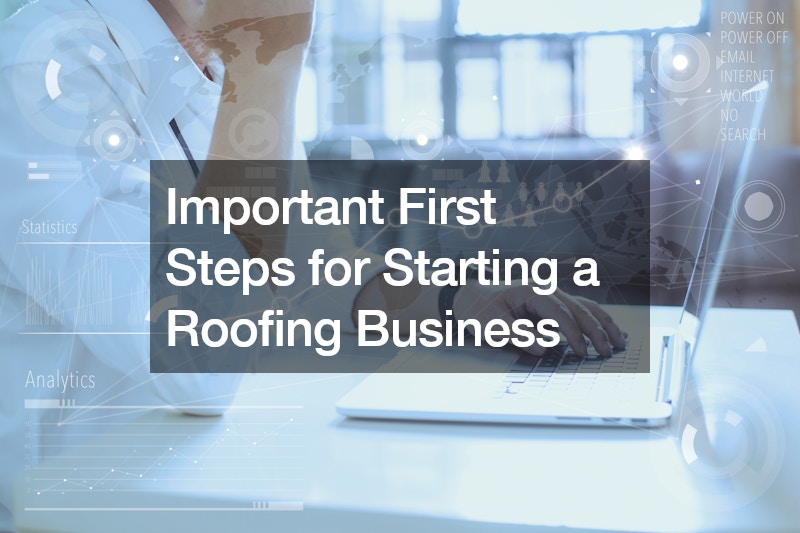Important First Steps for Starting a Roofing Business

Introduction
Welcome to a comprehensive guide on the important first steps for starting a roofing business. If you’re considering entrepreneurship in the roofing industry, you’ve come to the right place!

1. Why Start a Roofing Business?
Starting a roofing business can be a rewarding venture for those with a passion for construction and home improvement. Entrepreneurship in the roofing industry allows you to showcase your skills and expertise in providing essential services to homeowners.
Furthermore, there is a significant market demand for residential roofing services, making it a lucrative field to explore. As a local roofing contractor, you can cater to the needs of homeowners in your community and establish a strong reputation for quality workmanship.
By starting a roofing business, you have the opportunity to make a positive impact on your local community by offering reliable roof installations, roofing replacements, and repairs to ensure the safety and security of homeowners.
2. What Skills and Qualifications are Needed?
Before venturing into entrepreneurship and starting a roofing business, it is essential to have practical roofing experience to ensure you can deliver high-quality services to your customers. Whether you have worked as a roof installer or have hands-on experience in roof installation and repairs, having a solid foundation in roofing techniques is crucial.
In addition to roofing skills, business management skills are also essential for running a successful roofing business. As an entrepreneur in the roofing industry, you will need to manage finances, handle marketing and sales, and oversee day-to-day operations to ensure the growth and profitability of your local roofing company.
By combining your roofing expertise with strong business management skills, you can effectively establish and grow your roofing business, providing top-notch services to your customers while achieving long-term success in the industry.

3. How to Conduct Market Research?
Conducting thorough market research is vital for identifying opportunities and challenges when starting a roofing business. Start by analyzing your competitors to understand their strengths and weaknesses, pricing strategies, and target audience. This information will help you position your local roofing company effectively in the market.
Identifying your target audience is another crucial aspect of market research as it will help you tailor your services to meet the specific needs of homeowners in your area. By understanding the demographics, preferences, and pain points of your target customers, you can develop targeted marketing strategies to reach and attract them to your roofing business.
By conducting comprehensive market research, you can gain valuable insights into the competitive landscape, customer preferences, and industry trends, allowing you to make informed decisions and position your roofing business for success in your local market.
4. What Legal Steps are Required?
Before officially launching your roofing business, you must complete several legal steps to ensure compliance with regulations and protect your company. Business registration is essential for establishing your local roofing company as a legal entity and obtaining necessary permits and licenses to operate.
Depending on your location, you may need to obtain specific licenses and permits to perform roofing services legally. These requirements vary by state and local regulations, so it is crucial to research and fulfill all legal obligations to avoid any potential legal issues that could hinder the growth of your roofing business.
By taking the necessary legal steps to register your business, obtain licenses, and comply with regulations, you can establish a solid foundation for your roofing company and build trust with customers by demonstrating your commitment to operating a legitimate and reputable business.
5. How to Develop a Business Plan?
Creating a solid business plan is crucial for outlining your goals, strategies, and financial projections when starting a roofing business. Start with an executive summary that provides an overview of your company, mission statement, and key objectives to guide your business growth.
Financial projections are a critical component of your business plan, outlining your revenue forecasts, expenses, and profitability targets. By conducting thorough market research and analyzing industry trends, you can develop realistic financial projections that align with your business goals and help you secure funding for your roofing company.
A well-written business plan serves as a roadmap for your roofing business, outlining your strategies, goals, and financial projections to guide your decision-making and ensure the long-term success of your local roofing company.
6. What Funding Options are Available?
When starting a roofing business, you have several funding options available to support your venture. Bootstrapping, or self-funding, is a common approach for entrepreneurs who use personal savings or assets to finance their businesses without external investors.
If you require additional capital to fund your roofing business, small business loans from banks or financial institutions can provide the necessary funds to cover startup costs, equipment purchases, and operational expenses. These loans typically have varying interest rates and repayment terms, so it is essential to research and compare options to find the best financing solution for your local roofing company.
By exploring various funding options, you can secure the necessary capital to launch and grow your roofing business, enabling you to invest in equipment, marketing, and operational expenses to establish a strong presence in the market and attract customers to your services.
7. How to Build a Network in the Industry?
Building a strong network in the roofing industry is essential for establishing partnerships, gaining industry insights, and expanding your customer base. One effective way to network is by joining industry associations and organizations that offer networking opportunities, educational resources, and industry events to connect with other professionals in the field.
Attending trade shows and networking events specific to the roofing industry is another valuable way to build relationships with suppliers, manufacturers, and other local roofing contractors. These events provide an opportunity to showcase your services, learn about industry trends, and establish partnerships that can benefit your roofing business.
By actively networking with industry professionals and participating in relevant events and associations, you can build a strong network of contacts, gain valuable insights, and create opportunities for collaboration and growth when starting a roofing business.

8. What Equipment and Tools are Necessary?
As a local roofing contractor, having the right equipment and tools is essential for delivering high-quality services and ensuring the safety of your team. Basic roofing tools such as hammers, nail guns, ladders, and safety gear are essential for performing roof installations, replacements, and repairs effectively.
In addition to basic roofing tools, investing in safety equipment such as harnesses, fall protection gear, and personal protective equipment (PPE) is crucial for maintaining a safe work environment and preventing accidents on the job site. By prioritizing safety and investing in quality equipment, you can protect your team and deliver exceptional service to your customers.
By equipping your team with the necessary tools and safety equipment, you can enhance productivity, efficiency, and safety on the job site, ensuring that your roofing business operates smoothly and meets the highest standards of quality and professionalism.
9. How to Advertise and Market Your Business?
Establishing a strong online presence is essential for marketing your local roofing business and attracting customers in your area. Creating a professional website that showcases your services, portfolio, and customer testimonials is a powerful way to build credibility and attract leads in need of roof installations, replacements, and repairs.
Implementing local SEO strategies such as optimizing your website for local keywords, creating a Google My Business listing, and obtaining online reviews can help boost your visibility in local search results and attract customers searching for roofing services in your area. By focusing on local SEO, you can target customers in your community and drive traffic to your website to generate leads and conversions.
By leveraging online marketing tactics and implementing local SEO strategies, you can effectively promote your roofing business, reach your target audience, and attract customers in need of residential roofing services, roof inspections, and roof repair solutions in your local area.
10. What Insurance Coverage is Essential?
Securing the right insurance coverage is essential for protecting your roofing business, employees, and customers from potential risks and liabilities. General liability insurance provides coverage for property damage, bodily injury, and legal expenses resulting from accidents or negligence during roofing projects.
Workers’ compensation insurance is another essential policy that covers medical expenses, lost wages, and disability benefits for employees who are injured on the job. By providing workers’ compensation coverage, you can demonstrate your commitment to employee safety and protection while complying with legal requirements in your state.
By investing in comprehensive insurance coverage, you can safeguard your roofing business from potential risks and liabilities, protect your employees and customers, and operate with peace of mind knowing that you have the necessary protection in place to handle unforeseen events and emergencies.
11. How to Price Your Services?
Pricing your roofing services competitively is essential for attracting customers and generating revenue for your business. Start by calculating your costs, including labor, materials, overhead, and profit margins, to determine the pricing structure that ensures profitability while remaining competitive in the market.
Conducting competitive analysis to compare your pricing with other local roofing contractors can help you identify pricing trends, market rates, and value-added services that can set your company apart from competitors. By offering transparent pricing and value-based services, you can attract customers and build trust in your local roofing business.
By establishing competitive pricing, providing transparent estimates, and offering value-added services, you can position your roofing business as a trusted and reliable service provider in your local market, attracting customers in need of roof replacements, installations, inspections, and repairs.

12. What Customer Service Strategies to Implement?
Delivering exceptional customer service is crucial for building trust, loyalty, and customer satisfaction in your roofing business. Timely responses to customer inquiries, requests, and service calls demonstrate your commitment to providing prompt and reliable services while addressing customer needs efficiently.
Quality workmanship and service are key components of excellent customer service when starting a roofing business. By delivering high-quality roof installations, replacements, inspections, and repairs, you can exceed customer expectations and build a strong reputation for reliability and professionalism in your local community.
By implementing customer service strategies that prioritize responsiveness, quality, and customer satisfaction, you can build long-lasting relationships with customers, earn positive reviews and referrals, and establish your roofing business as a trusted and preferred service provider in your local market.
13. How to Scale Your Roofing Business?
Scaling a roofing business involves expanding your services, team, and customer base to achieve growth and profitability in the industry. Hiring employees to support your operations and deliver services is essential for expanding your capacity and meeting the demands of a growing customer base.
Exploring new service areas and expanding your geographic reach can help you reach new customers and attract leads outside your local market. By expanding your service offerings or targeting new customer segments, you can diversify your revenue streams and grow your roofing business effectively.
By scaling your roofing business strategically, hiring the right talent, and exploring new service opportunities, you can achieve sustainable growth, expand your market presence, and establish your company as a leader in the roofing industry, providing top-notch services to customers in your local community and beyond.
Conclusion
Congratulations on taking the first steps towards starting a roofing business. By following these important guidelines and strategies for entrepreneurship in the roofing industry, you are on your way to establishing a successful venture that offers top-notch residential roofing services, roof installations, replacements, inspections, and repairs to homeowners in your local market.
While there are several ways you can gear up and prepare for industry success, the quality of the services you provide will be a main factor in the success of your new roofing business. Focus on excellent customer service, durable roofing materials, and quick, accurate estimates to make a big splash in your local roofing sector. Highlight happy customer reviews and let your reputation and work speak for itself. Starting a roof business isn’t an easy feat, but with the right tools and knowledge, you can become a local leader. Good luck on your journey as a local roofing contractor!


